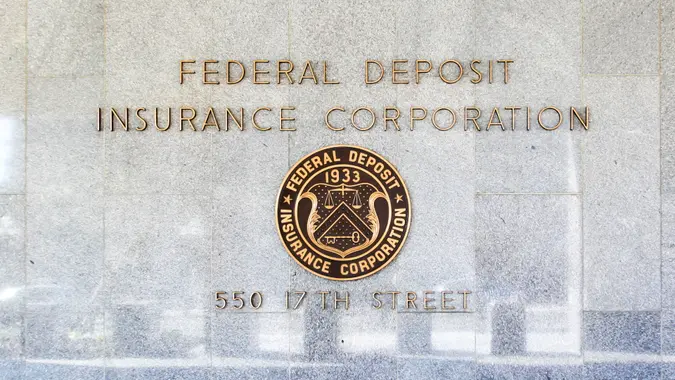The Pros and Cons of Credit Unions

Commitment to Our Readers
GOBankingRates' editorial team is committed to bringing you unbiased reviews and information. We use data-driven methodologies to evaluate financial products and services - our reviews and ratings are not influenced by advertisers. You can read more about our editorial guidelines and our products and services review methodology.

20 Years
Helping You Live Richer

Reviewed
by Experts

Trusted by
Millions of Readers
When it comes to managing personal finances, the choice between a credit union and a traditional bank is a significant one. It’s crucial to understand the pros and cons of credit unions to make an educated choice about where to manage your finances. Read on to explore the benefits and drawbacks and determine if a credit union is a suitable choice for your banking requirements.
What Is a Credit Union?
A credit union is a financial institution that’s owned and run by its members. It’s set up like a cooperative, where the focus is on helping members save money, access loans at reasonable rates and use other financial services. Unlike traditional banks, which aim to make profits for shareholders, credit unions are nonprofit organizations. This structure allows them to focus on serving the financial needs and interests of their members, which can include offering savings accounts, checking accounts, CD accounts and loans.
Pros of a Credit Union
Credit unions are member-owned financial institutions that often provide a more personalized banking experience. Here are some pros of a credit union:
- Member-focused structure: Unlike traditional banks, credit unions are not-for-profit organizations owned by their members. This structure often leads to more customer-focused services and policies.
- Competitive interest rates: Credit unions frequently offer higher interest rates on savings accounts and lower rates on loans and credit cards.
- Lower fees: One of the significant pros of a credit union is the typically lower fees for account maintenance, transactions and overdrafts compared to traditional banks.
- Community involvement: Credit unions are community-oriented, focusing on the financial well-being of their members and the local community.
Cons of a Credit Union
While there are many benefits to using a credit union, there are also some cons of credit unions to consider:
- Limited accessibility: Credit unions may have fewer branches and ATMs, which can be a drawback for those who travel frequently or prefer in-person banking.
- Restricted membership: Some credit unions have membership restrictions based on employment, location or other affiliations.
- Technology and services: Credit unions may not offer the same level of technology, such as mobile banking apps or advanced online services, as larger banks.
- Variety of financial products: There might be a more limited selection of financial products compared to larger banks, which could affect those looking for a wide range of investment or loan options.
Credit Unions Compared To Traditional Banks
When comparing credit unions to traditional banks, several key differences stand out. While both institutions offer similar financial products and services, credit unions are known for their member-centric approach. This often translates into more favorable interest rates, lower fees and a more personalized customer service experience.
Banks, on the other hand, generally have a broader national presence, with more branches and ATMs, and may offer a wider range of financial products and services. Banks also tend to invest more in technology, providing robust online and mobile banking platforms.
Good To Know
When considering the pros and cons of credit unions, it’s important to align your banking needs with what credit unions offer.
If personalized service, better rates and lower fees are your priorities, a credit union could be an excellent choice.
However, if you require broader accessibility, more advanced technological services or a wider range of financial products, a traditional bank might be more suitable.
Final Take
When weighing the pros and cons of credit unions, consider how each aspect aligns with your banking requirements. Are the higher savings rates and lower fees more appealing, or do the potential limitations in accessibility and services outweigh the benefits? Understanding the full range of benefits and drawbacks will aid in making a well-informed decision about where to open your bank account. Remember, the best choice depends on your individual financial needs and lifestyle preferences.
FAQ
Here are the answers to some of the most frequently asked questions regarding credit unions.- Is there a downside to a credit union?
- The downsides to a credit union can include limited accessibility, as they often have fewer branches and ATMs. Additionally, some credit unions may offer a narrower range of financial products and services and may lag in advanced technology and online services.
- Is it better to have a bank or a credit union?
- Whether a bank or a credit union is better depends on your personal financial needs. If you prefer lower fees, higher savings rates and a more community-focused institution, a credit union might be better. However, if you need broader access to branches and ATMs or more diverse financial products, a traditional bank might be more suitable.
- What is the biggest advantage of a credit union?
- The biggest advantage of a credit union is its member-centric approach. This often results in better interest rates, lower fees and more personalized customer service. Being nonprofit entities, credit unions are focused on serving the best interests of their members rather than maximizing profits.
Editor's note: This article was produced via automated technology and then fine-tuned and verified for accuracy by a member of GOBankingRates' editorial team.
 Written by
Written by 
























